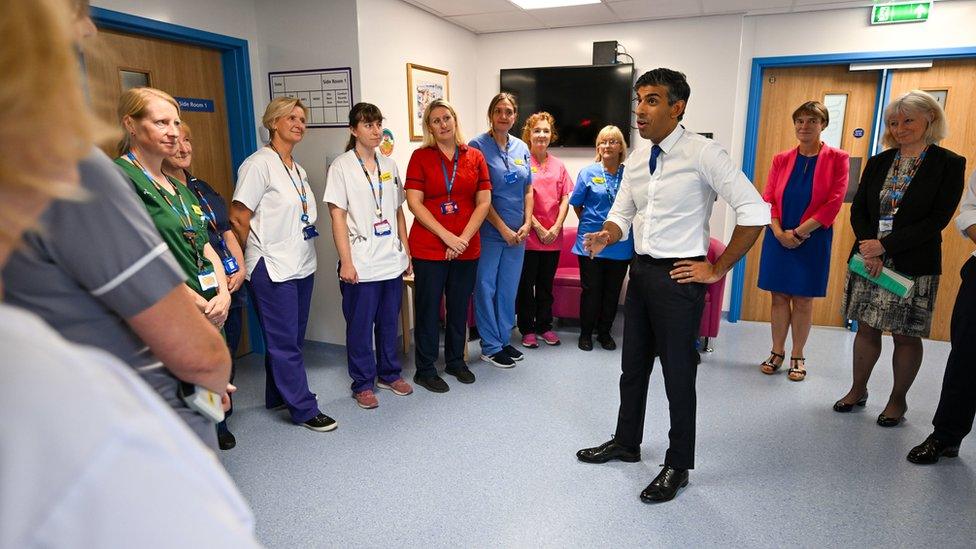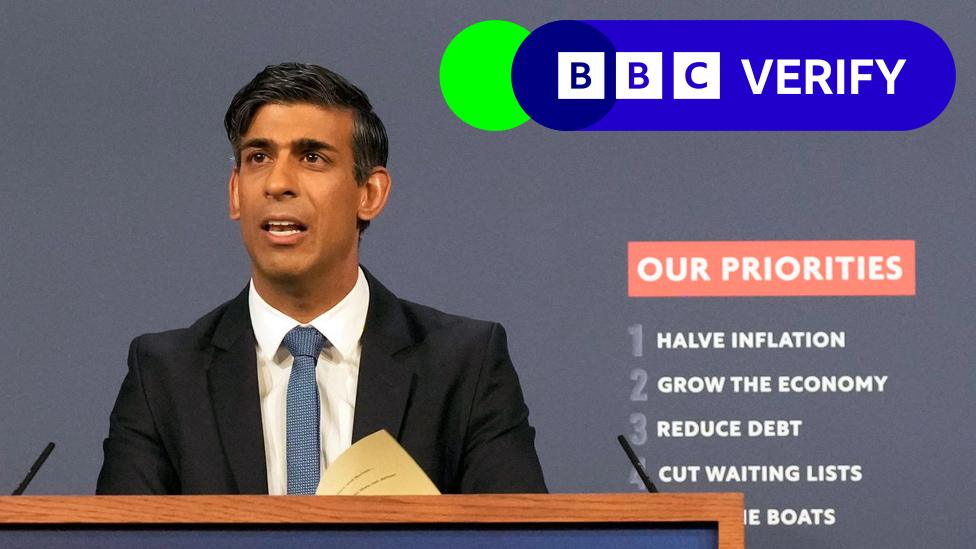NHS waiting lists, strikes and political promises
- Published
- comments

The promise from the prime minister in the first week of January was clear. "NHS waiting lists will fall and people will get the care they need more quickly," he said., external
And yet, waiting lists in England are getting longer and longer. They are at a record high.
The gap between the promise and reality is stark.
But what really struck me was how direct the prime minister has chosen to be in two ways.
Firstly, to acknowledge more bluntly than ever before that his promise is - for now at least - going up in a puff of smoke.
And secondly, why he thought that was happening.
He blames the strikes in the NHS.
It sets up an invitation for you to decide who you blame: Medics on picket lines or the prime minister?
Granted, for some time ministers have referred in the round to industrial action making it harder to bring waiting lists down.
But Rishi Sunak has now gone considerably further than that.
He said the government was making "very good progress" before the strikes. And without them, he reckons, he would have kept his promise.
Figures inside the NHS don't dispute the colossal impact of the strikes.
One long-standing manager told me the extra £200m promised for the NHS this winter wouldn't come close to covering the costs of the doctors strikes so far - let alone those still to come.
They added, though, that the number of vacancies in the NHS and rising demand are other big contributory factors to the backlogs.
But a government source zoomed in on the consequences of industrial action.
"The impact is much bigger than just the strike days," they said.
"The knock-ons are huge - not only are so, so many appointments postponed, they all then have to be re-arranged. It's a huge amount of extra work."

Rishi Sunak meeting staff in North Devon District Hospital, Barnstaple
Next week will see junior doctors and consultants in England walk out at the same time for the first time in the history of the NHS.
So, is there any prospect of a resolution to the industrial action?
Right now, the answer feels like no.
Those I speak to in government, publicly and privately, appear resolute. The pay offer to doctors is "final" and further walkouts won't change that they say.
They argue doctors have been offered what they see as a generous pay rise and loads of other NHS staff have accepted their pay offers.
The shadow health secretary Wes Streeting told me "it is deeply cynical to blame NHS staff for rising waiting lists," adding: "I don't think he's interested in sorting out these strikes. He's got a scapegoat."
Labour say if they were in government they would talk to the striking doctors, but it's not clear precisely how they would pacify them, given their pay demands appear well in excess of what Labour would be willing to pay.
So either way these strikes are costly: Costly in their impact and costly to the public purse to resolve.
The former Conservative Health Minister Lord Bethell said the strikes "are fundamentally the cause of the current problem" in the NHS.
But, on Rishi Sunak's promise to cut waiting lists, he added: "I think the pledge was a mistake frankly."
Whoever is chosen for blame here, the prime minister chose to make a promise.
And he's now acknowledging it is one he is breaking.
Related topics
- Published14 September 2023

- Published9 December 2022
- Published17 June 2024
